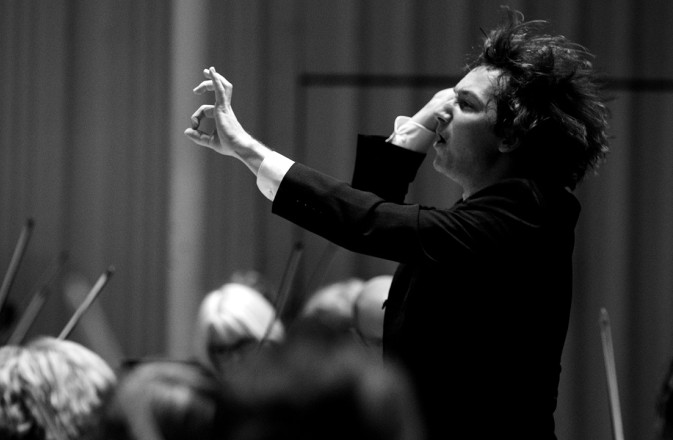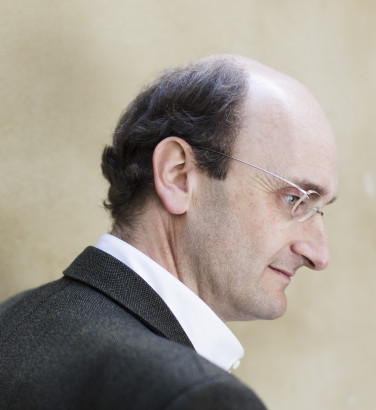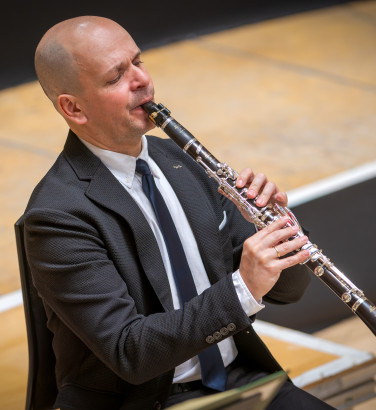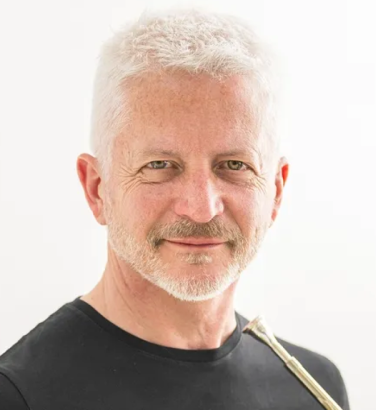
Aylen Pritchin: "you should not forget the human side of Brahms' concerto"
23 Jan 2023
News Story
To mark what could be described as a mini-Brahms Festival in late February, the SCO and Maxim Emelyanychev are joined by violinist Aylen Pritchin for an exploration of the great man's orchestral and chamber works. A regular recital partner of Maxim's, Aylen plays Brahms' beloved Violin Concerto (23-24 February) before the two lead an ensemble of SCO players for Brahms' Chamber Passions (26 February). This second concert culminates in one of the very finest pieces of chamber music repertoire, the Piano Quintet in F minor.
In anticipation of these performances, we are delighted that Aylen agreed to a short interview.
How did you and Maxim Emelyanychev meet, and how long have you been performing together?
Maxim and I first met back when we were both studying at Moscow Conservatory and we started to perform together at the same time. During these student years we did various projects, lot of chamber music, baroque music, everything possible. Perhaps the most unusual experience for me was to play continuo part on cembalo while he was conducting! Anyway since then we’ve been performing a lot together and I’m looking very much forward to our Brahms project.
What makes chamber music such an important part of your life?
I guess since violin players don’t perform alone very often there is no surprise that chamber music is taking an important role in our life. In chamber music there is no not-important voice, you are part of something bigger but at the same time the personal vision of each musician matters a lot. It’s like having a conversation in music with your partners and sometimes you don’t know where it could bring you. The sense of making music right at the moment, the pleasure of making it together, it’s hard to overestimate all of it. I believe the same approach applies when we talk about concerto repertoire as well (leaving some purely virtuoso pieces like Paganini concertos). Beethoven, Berg concertos, for example, or Stravinsky - all of these definitely require a more subtle approach and it’s always very enjoyable to feel that musicians are ready to communicate with you in order to create something more personal.
Aylen Pritchin’s sound is luminous, his playing imperial.
Brahms’ concerto is so well-loved that it can be difficult to make sense of the early criticism that it was written “against the violin”. As a violinist, can you explain why this may have been said?
Speaking of Brahms’ concerto we find the same thing: only in very rare moments the soloist plays a nice tune while the orchestra has just an accompanying function. In fact you have to be extremely attentive to everything happening around you and be sure your own part (which is quite demanding by itself) goes through at the same time. The difficulty of this concerto is that despite it’s a large-scale work which requires a lot of power you should not forget the human side of it.
It is a rare treat to hear the same musicians perform Brahms’ violin concerto and chamber music within a few days of each other. How does it feel to immerse yourself in his music like this?
I feel very lucky indeed to get such a chance to experience so much of his music within just a few days. These pieces we’re playing were written in different periods of Brahms’ life and it’s interesting to see different facets of his intriguing personality.
There is of course no shortage of masterpieces in the violin repertoire. Are there any works you feel are consistently overlooked, which you would love to perform more often?
I always like to discover and to explore new fields in terms of violin repertoire and of course during this journey you realize that many fantastic pieces are almost unknown to the public for different reasons and I’m not even talking about contemporary works. Just to name a few : Schumann, Britten, Szymanowski, Bartók, Martinů - 2nd concerto of Martinů was written 80 years ago already, it’s been enough time to start to appreciate it.

Maxim Conducts Brahms
Our first Brahms concert features a pair of orchestral cornerstones: the epic Violin Concerto and his equally monumental Symphony No 1, often described as Beethoven's Tenth.

Brahms's Chamber Passions
Join Maxim, Aylen and members of the SCO for a trio of Brahms masterpieces, all of them jewels of the chamber music repertoire.
Related Stories
![]()
Andrew Manze: "I've always loved Viennese waltzes and polkas"
1 December 2025
Our Principal Guest Conductor is really looking forward to conducting our Viennese New Year concerts!![]()
Maximiliano Martín: "A friend said 'Gnarly Buttons would suit you very well'"
10 November 2025
Ahead of his performance of John Adams' Gnarly Buttons, we spoke to our Principal Clarinet about performing as soloist with the Orchestra.![]()
Quickfire Questions with Kenneth Henderson
7 November 2025
Get to know our new Principal Horn!


